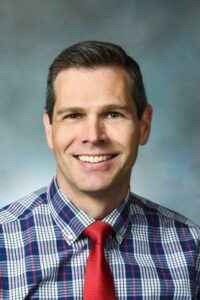GREENEVILLE – Community members can enrich their faith lives in February by attending Theologian-In-Residence at Tusculum University for in-depth presentations about the Satan and evil.

Dr. Ryan Stokes
Theologian-In-Residence will take place every Friday at 10 a.m. in February – Feb. 3, Feb. 10, Feb. 17 and Feb. 24 – in Chalmers Conference Center of the Scott M. Niswonger Commons and via the Zoom virtual platform. This year’s presenter will be Dr. Ryan Stokes, director of graduate theological studies and associate professor of biblical studies at Carson-Newman University. The theme for the four-part series is “The Satan and the forces of evil.”
Attendance is free, but donations make it possible for Tusculum to present this cherished tradition.
“Join us at Tusculum for spiritual nourishment and enjoy the fellowship of others who are growing in their faith and their understanding of Satan,” said Dr. Chris Shumate, the university’s campus minister. “Dr. Stokes is an excellent scholar with an avid interest in sharing about the Bible with others, and he will continue Tusculum’s history of presenting compelling subject matter at Theologian-In-Residence. The strength of Theologian-In-Residence comes from its devotional and intellectual dimensions, which stimulate and inform participants’ knowledge of the Bible.”
Here is a summary of the presentations provided by Dr. Stokes:
- Feb. 3 – The origin of Satan: The Satan in the Old Testament – Where did the idea of Satan come from? What did the Old Testament writers have to say about this figure? This lecture will begin by considering what the Hebrew word “satan” means and then take a close look at each Old Testament text that refers to a superhuman satan. It will consider how the earliest texts that mention this figure portray him somewhat differently from his portrayals in later tradition.
- Feb. 10 – Fallen Angels, Evil Spirits and Demons – What does the Bible say about “fallen angels”? What are demons and what are evil spirits? Modern theologians frequently use the designations “fallen angels,” “demons” and “evil spirits” interchangeably. The Bible and other ancient texts, however, often distinguish these as different kinds of harmful beings. This presentation will discuss the origins and development of thinking about these mysterious beings in biblical and related literature.
- Feb. 17 – The Satan in the Dead Sea Scrolls and Other Early Jewish Writings – Early Jewish literature, such as the Dead Sea Scrolls, while not part of the Bible, contain many ideas that bridge the historical and theological gap between the Old and New Testaments. For the theologian who wishes to appreciate the teachings of the Bible, these texts are invaluable. This presentation will summarize what these texts say about the Satan and other malevolent spiritual forces and what they contribute to one’s understanding of the biblical teaching about these figures.
- Feb. 24 – Satan in the New Testament – What did the New Testament authors teach about Satan? In particular, how was Satan relevant to the life of the Christian? Also, how does the work of Christ bring about the defeat of Satan? This lecture, which will consider how Satan is portrayed in the New Testament Gospels, Epistles and Revelation, will answer these questions.
Dr. Stokes has authored a number of scholarly articles and essays about the Bible and wrote the book “The Satan: How God’s Executioner Became the Enemy.” He is an ordained minister who has served as pastor of congregations in Connecticut and Kentucky. He likes preaching and teaching the Bible in churches.
He holds a Bachelor of Arts from Western Kentucky University and a Master of Arts from Gordon-Conwell Theological Seminary. He has also earned a Master of Arts, a Master of Philosophy and a doctorate from Yale University.
“We thoroughly enjoy having the community on campus and via Zoom for the excellent Theologian-In-Residence presentations each year,” said Dr. Scott Hummel, Tusculum’s president. “It is terrific to see the diversity and number of churches represented at the sessions and the role this event plays in advancing people’s understanding of their faith. We are pleased these community members have invested their time to strengthen their faith lives and are grateful they have chosen Tusculum as the venue.”
To register for Theologian-In-Residence, please call the Office of Institutional Advancement at 423-636-7303 or email kkidwell@tusculum.edu. Those who prefer to attend sessions via Zoom will receive the link when they register. Anyone who attends in person is eligible to receive a voucher for a free lunch that day in the Tusculum cafeteria.
Additional information about campus ministries at the university is available at https://site.tusculum.edu/campus-ministries/. To learn more about the university, please visit www.tusculum.edu.


